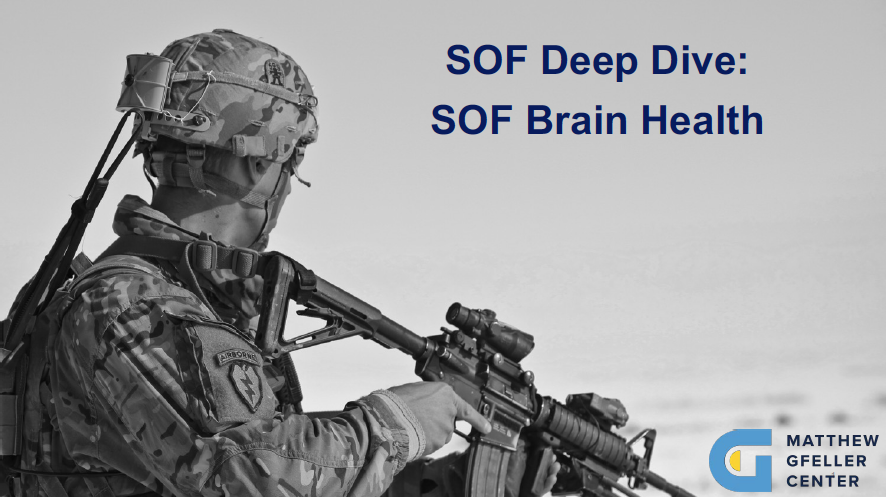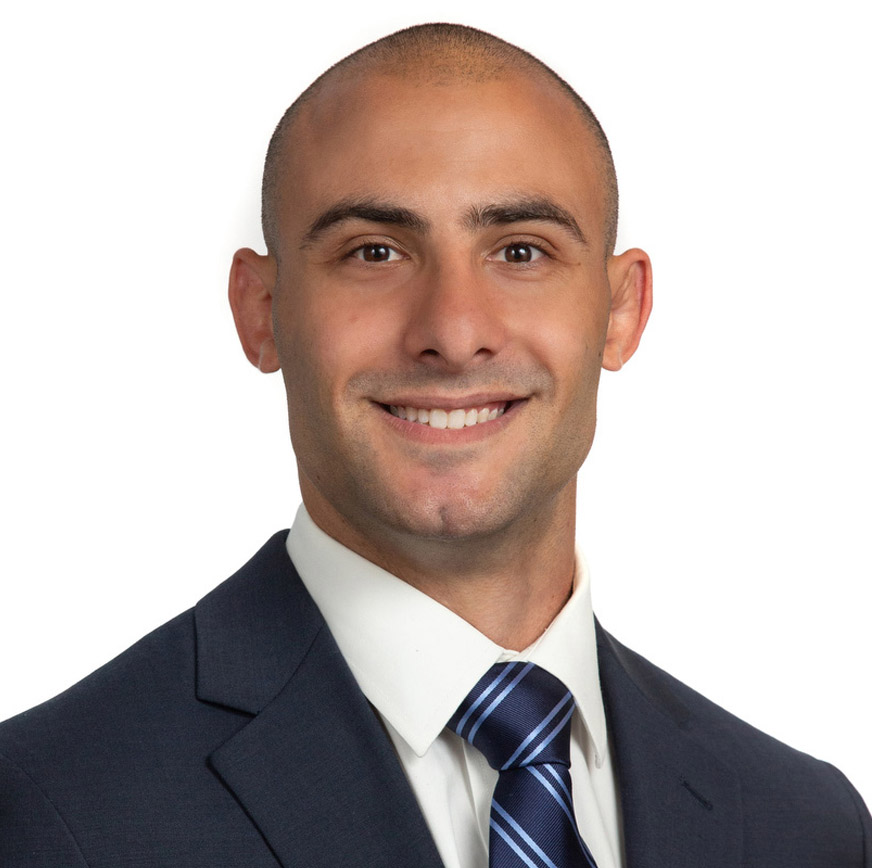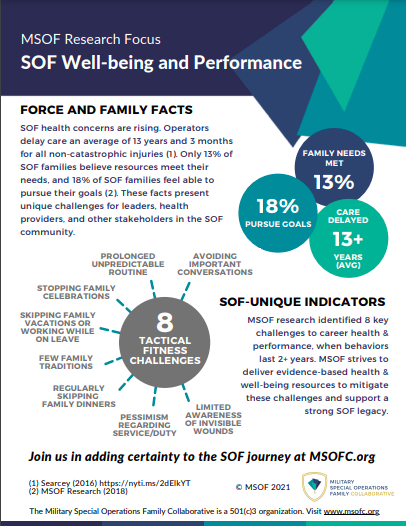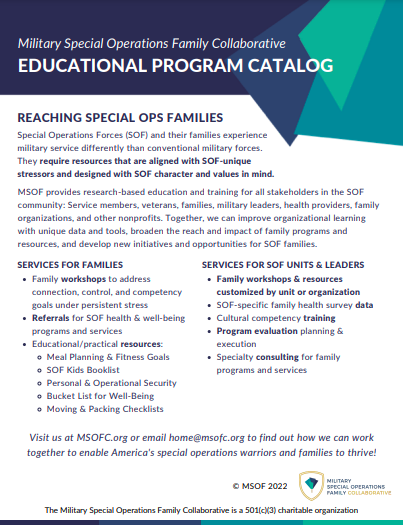
SOF Health Deep Dive: Traumatic Brain Injury
If you tuned into our SOF Health Deep Dive on September 19, 2022, you participated in a discussion that was specifically built around community health and well-being questions and concerns. Dr. Jason Mihalik of the Transforming Health & Resilience in Veterans (THRIVE) Program thoughtfully put together an all-star team for this Deep Dive on mild Traumatic Brain Injury (mTBI) in the special operations community. If you missed this remarkable presentation and discussion you can watch the event recording and access the resources shared below. And please share with any SOF operator, family member, caregiver, or healthcare provider who may benefit from this information.
Often we hear of individuals who hold off on seeking care believing others need it more. They simply keep compartmentalizing their challenges and put off care that could actually address symptoms. Please consider contacting the THRIVE Program about care if you are a veteran (or a loved one of a veteran) experiencing symptoms that could be tied to mTBI or Post Traumatic Stress Disorder.
If you attended the Deep Dive and haven’t yet filled out the post-event feedback survey, please help us to make future events even better.
Deep Dive Replay
The MSOFC team pulled out some key take-aways by the minute to highlight questions frequently asked. You can easily jump to these spots by clicking on the timestamp in the YouTube video description.
- 00:00:00 Introduction
- 00:10:05 Care-seeking patterns
- 00:12:35 Symptoms
- 00:15:37 TBI & SOF
- 00:26:15 fMRI as clinical diagnostic
- 00:30:10 Long-term physiological impacts
- 00:32:36 fMRI & brain network resilience
- 00:41:19 Blood biomarkers
- 00:47:10 Old brain injuries/concussions
- 01:00:34 Endocrine (Testosterone) &TBI
- 01:07:08 SOF as a unique health population
- 01:17:30 Subconcussive impacts
- 01:21:45 Command/unit awareness
- 01:22:54 Brain health & mental health
- 01:32:40 HBOT as a care intervention
- 01:40:03 Psychedelics as a care intervention
- 01:43:20 THRIVE Program for veterans at UNC
- 01:52:05 Family care model
Thank you to our Deep Dive Expert Speakers!

- Jason Mihalik, PhD, CAT(C), ATC, FACSM, FNATA: Director of the Matthew Gfeller Center at the University of North Carolina at Chapel Hill, and Chief Executive Officer, Transforming Health & Resilience in Veterans (THRIVE) Program
- LTC (Ret.) Stephen M. DeLellis, MPAS-C: Senior Technical Advisor and Director at Fort Bragg Research Institute, a program of The Geneva Foundation
- COL (Ret.) James H. Lynch, MD: Primary Care Sports Medicine Physician and co-founder of The Stellate Institute
- Wesley Cole, PhD, CBIS: Research Associate Professor, Matthew Gfeller Center at The University of North Carolina at Chapel Hill, and Neuropsychologist, Transforming Health & Resilience in Veterans (THRIVE) Program
- Jacob R Powell, MS, LAT, ATC: Researcher at the Matthew Gfeller Center at the University of North Carolina at Chapel Hill




To get in-touch with the experts, email us at home@msofc.org.
Deep Dive Resources
Our expert panel generously provided access to their slides here.
Helpful Websites and Articles
- Health.mil: Army Announces FDA Clearance of Field-Deployable TBI-Blood Test
- VA: Evidence Brief for HBOT for TBI or PTSD
- Health.mil: Neuroendocrine Dysfunction Screening Post TBI Clinical Support Tool
- North Carolina Center for Optimizing Military Performance
- TBI Center at UNC
- Walter Reed Army Institute of Research: WRAIR’s Investigator’s Dispatch on Traumatic Brain Injury Awareness
- BPC-157 Supplement: “BPC-157 is a synthetic peptide that is being investigated for its regenerative effects. It shows high efficacy for rats suffering toxic or surgical trauma, but there is currently no evidence that it provides benefits for people.”
Research & Academic Papers
- Hyperbaric oxygen for blast-related postconcussion syndrome: three-month outcomes. Cifu DX, Walker WC, West SL, Hart BB, Franke LM, Sima A, Graham CW, Carne W. Hyperbaric oxygen for blast-related postconcussion syndrome: three-month outcomes. Ann Neurol. 2014 Feb;75(2):277-86. doi: 10.1002/ana.24067. Epub 2014 Feb 20. PMID: 24255008.
- Neuroinflammatory Biomarkers Associated With Mild Traumatic Brain Injury History in Special Operations Forces Combat Soldiers. Powell JR, Boltz AJ, DeCicco JP, Chandran A, DeLellis SM, Healy ML, Kane SF, Lynch JH, Means GE, Hackney AC, Mihalik JP. Neuroinflammatory Biomarkers Associated With Mild Traumatic Brain Injury History in Special Operations Forces Combat Soldiers. J Head Trauma Rehabil. 2020 Sep/Oct;35(5):300-307. doi: 10.1097/HTR.0000000000000598. PMID: 32881763.
- Neurovascular Coupling in Special Operations Forces Combat Soldiers. Roby PR, DeCicco JP, Chandran A, Barczak-Scarboro N, DeLellis SM, Ford CB, Healy ML, Means GE, Kane SF, Lynch JH, Mihalik JP. Neurovascular Coupling in Special Operations Forces Combat Soldiers. Ann Biomed Eng. 2021 Feb;49(2):793-801. doi: 10.1007/s10439-020-02604-y. Epub 2020 Sep 17. PMID: 32944852.
- Relationship between Anterior Pituitary Volume and IGF-1 Serum Levels in Soldiers with Mild Traumatic Brain Injury History. Castellano AK, Powell JR, Cools MJ, Walton SR, Barnett RR, Delellis SM, Goldberg RL, Kane SF, Means GE, Zamora CA, Depenbrock PJ, Mihalik JP. Relationship between Anterior Pituitary Volume and IGF-1 Serum Levels in Soldiers with Mild Traumatic Brain Injury History. Med Sci Sports Exerc. 2022 Aug 1;54(8):1364-1370. doi: 10.1249/MSS.0000000000002892. Epub 2022 Feb 8. PMID: 35838301; PMCID: PMC9287595.
- Effect of Stellate Ganglion Block Treatment on Posttraumatic Stress Disorder Symptoms: A Randomized Clinical Trial. Rae Olmsted KL, Bartoszek M, Mulvaney S, McLean B, Turabi A, Young R, Kim E, Vandermaas-Peeler R, Morgan JK, Constantinescu O, Kane S, Nguyen C, Hirsch S, Munoz B, Wallace D, Croxford J, Lynch JH, White R, Walters BB. Effect of Stellate Ganglion Block Treatment on Posttraumatic Stress Disorder Symptoms: A Randomized Clinical Trial. JAMA Psychiatry. 2020 Feb 1;77(2):130-138. doi: 10.1001/jamapsychiatry.2019.3474. Erratum in: JAMA Psychiatry. 2020 Jan 2;: Erratum in: JAMA Psychiatry. 2020 Sep 1;77(9):982. PMID: 31693083; PMCID: PMC6865253.
If you missed the August Team Room you can watch the replays at the Global SOF Foundation website. And check out other virtual SOF health events by subscribing to MSOF’s YouTube channel.



